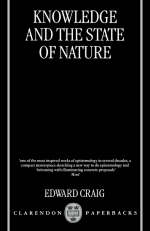
Knowledge and the State of Nature
Oxford University Press (Verlag)
978-0-19-823879-9 (ISBN)
The standard philosophical project of analysing the concept of knowledge has radical defects in its arbitrary restriction of the subject matter, and its risky theoretical presuppositions. Edward Craig suggests a more illuminating approach, akin to the `state of nature' method found in political theory, which builds up the concept from a hypothesis about the social function of knowledge and the needs it fulfils. Light is thrown on much that philosophers have written about knowledge, about its analysis and the obstacles to its analysis (such as the counter-examples of Edmund Gettier), and on the debate over scepticism. It becomes apparent why many languages not only have such constructions as `knows whether' and `knows that', but also have equivalents of `knows how to' and `know' followed by a direct object. Thus the inquiry is both broadened in scope and made theoretically less fragile.
Nature and motivation of project. Doubts answered. Plato, Pears, Hobbes, comparison with state-of-nature theory in political philosophy. Evolutionary epistemology; Derivation of first condition; the problem whether belief necessary. Necessary and sufficient conditions an unsuitable format. The prototypical case; Need for third condition. Discussion of the Nozick - Dretske analysis; Why causal theory, tracking, reliabilism all good approximations. Why justified true belief a good approximation. Comparison with Grice; Distinction between informant and source of information; its nature and point. Application to putative 'knowledge without belief' cases; and to comparitivism: Goldman; Being right by accident. All analyses insufficient. Blackburn: the Mirv/Pirv principle; Local v. global reliabilism. Discussion of McGinn; Externalist and internalist analyses. The first-person case. Knowing that one knows; Insufficiency of the various analyses. The 'No false lemma' principle. Its rationale -- and its effect; Objectivisation. The 'cart before the horse' objection -- and the response; Lotteries and multiple premises: the pull towards certainty. Knowledge and natural laws; Objectivisation and scepticism. Unger's first account; Two explanations of scepticism: the first-person approach, and the absolute perspective; Knowledge and involvement. What makes truth valuable?; Testimony and the transmission of knowledge. Welbourne: believing the speaker; Other locutions: Knowing Fred. Information v. acquaintance. Interacting with Fred. Knowing London -- and German; Other locutions: Knowing how to. The inquirier and the apprentice. 'Knows how to' compared with 'can' and with 'knows that'; Appendix Unger's semantic relativism; References; Index
| Erscheint lt. Verlag | 1.2.1999 |
|---|---|
| Verlagsort | Oxford |
| Sprache | englisch |
| Maße | 138 x 217 mm |
| Gewicht | 223 g |
| Themenwelt | Geisteswissenschaften ► Philosophie ► Erkenntnistheorie / Wissenschaftstheorie |
| ISBN-10 | 0-19-823879-7 / 0198238797 |
| ISBN-13 | 978-0-19-823879-9 / 9780198238799 |
| Zustand | Neuware |
| Haben Sie eine Frage zum Produkt? |
aus dem Bereich


